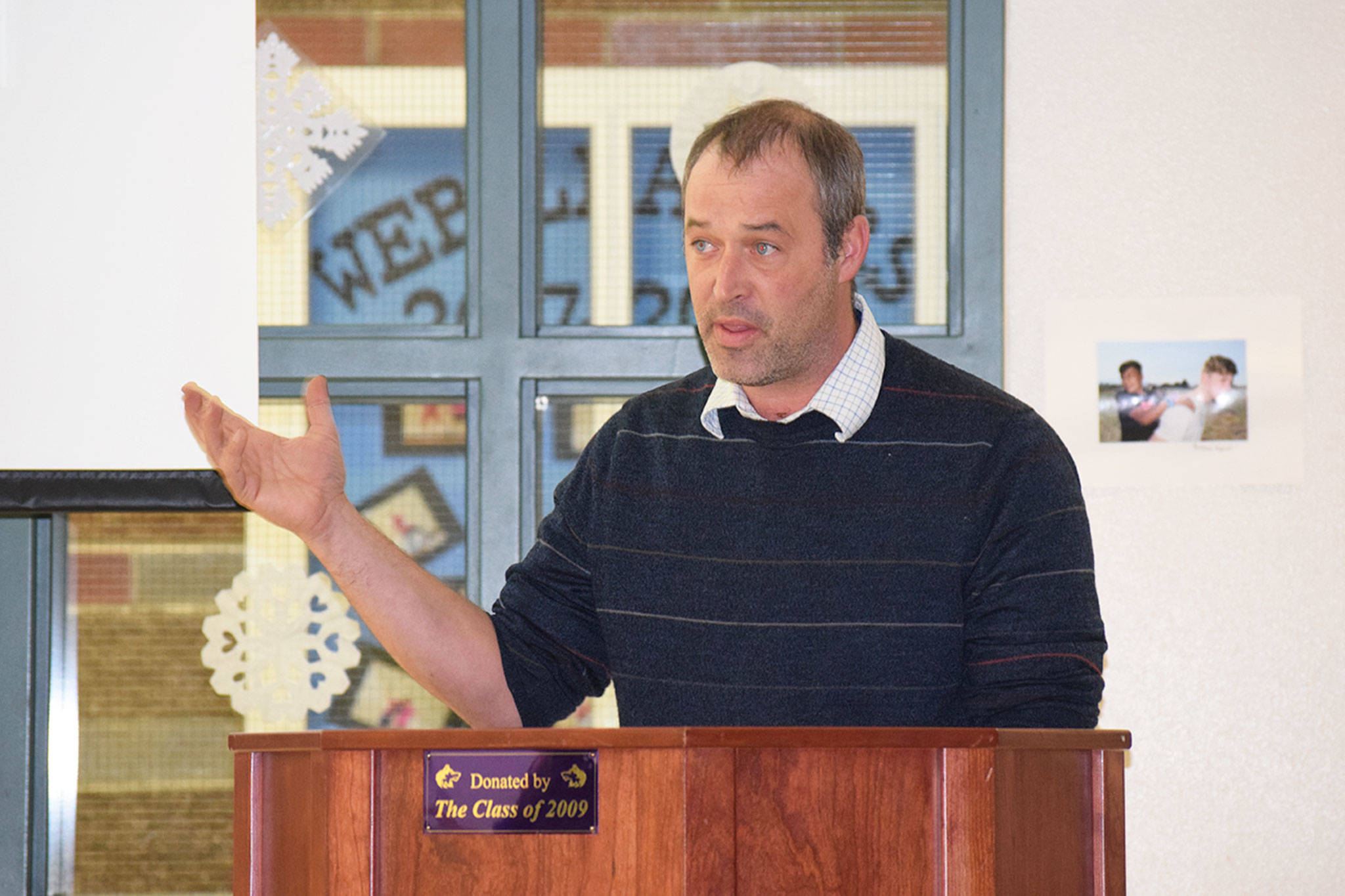SEQUIM — Classroom space — or lack thereof — continues to be an issue at Sequim schools, particularly for at least one teacher at Greywolf Elementary School.
Aaron Reno, a fifth-grade math teacher at Greywolf who teaches his two classes out of the school’s library, made a formal request to the board during public comments at a Dec. 3 meeting, asking board members to look into options to create more space for elementary school students and teachers.
“We’re packed out at Greywolf,” Reno said. “We’re not going to have classrooms for our teachers.”
Reno said he has taught his classes out of the library since the beginning of the school year and does not know when another classroom space will be available.
In an email before the Dec. 3 meeting, Reno said he has 26 students in one class and 25 in another.
“I don’t have a desk, closet, sink, drinking fountain, space to grade, I don’t have a classroom. We can’t put student work up, no charts like place value or multiplication tables,” he said.
“Simple things like coat hooks don’t exist so backpacks and coats are all over the floor creating a hazard. Trying to teach math in these conditions is difficult at best.”
Reno said he faces constant interruptions while trying to teach out of the library, which also interrupts lessons the librarian is trying to teach.
“Kids are checking out books while I am teaching. Literally, random kids going behind me to get the book of choice while I am teaching. There is zero space,” he said.
“I can do it, but it isn’t right. Kids deserve a school. Kids deserve space. Kids deserve a classroom. Greywolf is growing and this problem isn’t going away.”
District officials purchased two portables from Central Kitsap School District in July — one to be set at Helen Haller Elementary School and another at Greywolf — but they are not yet ready for students. The portables would create two new classrooms at each elementary school.
In previous interviews, Sequim Schools Superintendent Gary Neal said establishing fire suppression and fiber optics capabilities at Olympic Peninsula Academy’s (OPA) six portables is the district’s first priority before tending to other portables in the district.
Neal said at the Dec. 3 meeting that OPA’s fire suppression and fiber optics capability is in the process of installation.
“Fire suppression and fiber optics should be done by January,” Neal said.
Future school projects
At the end of the meeting, Neal gave a presentation to the board in response to a request board members sent the superintendent after the Nov. 19 regular meeting at Greywolf Elementary School. Neal was not present for the Nov. 19 meeting.
The request asked the superintendent for “next steps” regarding the district’s future capital projects.
In Neal’s presentation, he detailed the history of the district’s several failed bond proposals, specifically a $55 million construction bond proposal Neal developed in 2016 but was later retracted after school board directors did not approve the plan.
Neal also outlined the current capital projects levy that was approved by voters in a special election in 2017 to deconstruct the 1949 portions of the Sequim Community School and rebuild the district’s central kitchen at a cost of about $5.7 million over a three-year period (2018-21).
The Sequim Community School is set to be demolished by the end of December and the new central kitchen is expected to be up and running by January 2019.
At the end of the presentation, Neal left it up to board members to give him direction as to how to proceed with capital projects going forward, asking, “If another capital levy, how much and for what?” and, “If a construction bond, what amount?”
No board members made comments after Neal’s presentation, but in an interview after the board meeting president Brian Kuh said there was a miscommunication on the timing of when the response was expected to be given.
“I didn’t expect the superintendent to address [the request] at the board meeting; however, it did start the dialogue as far as what’s next,” Kuh said.
“We wanted to check in as a board to talk about that, especially since the community school project is continuing to come to an end.”
Kuh said board members will discuss possible capital project workshops or public meeting dates at the next board meeting, set for 6 p.m. this Monday at Helen Haller Elementary School’s library, 350 W. Fir St.
Kuh said he is interested to see what the public wants going forward following construction of a new district kitchen and demolition of the Sequim Community School.
“We want to have some level of discussion touching base with what those facility needs are,” Kuh said.
“I’m personally excited about coming toward the tail end of this phase. We’ve witnessed these very punctuated facility needs.”
The board met in a special meeting last Monday, and then met in executive session to review the performance of a public employee with no action taken.
________
Erin Hawkins is a reporter with the Olympic Peninsula News Group, which is composed of Sound Publishing newspapers Peninsula Daily News, Sequim Gazette and Forks Forum. Reach her at ehawkins@sequimgazette.com.

